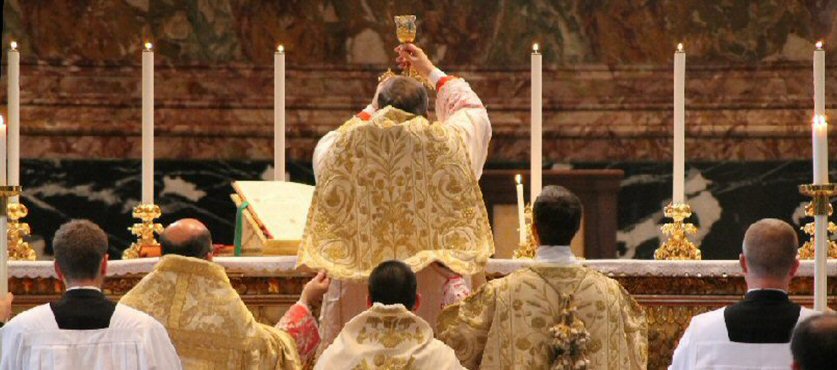Correspondence between John Gresser and Mgr. Perl, secretary of the Commissio Ecclesia Dei
Taken from an article in the Australian magazin 'Orient', (summer 1998)
First letter from Mr John Gresser to the Commissio Ecclesia Dei:
ROSELANDS, NSW, AUSTRALIA
14 June 1995
His Eminence Antonio Cardinal Innocenti
President, Commission Ecclesia Dei
Your Eminence,
I am seeking a precise understanding of the meaningof the motu proprio "Ecclesia Dei".
- What constitutes a "rightful aspiration" to worshipaccording to the liturgical books of 1962?
- Can anyone have or acquire such a rightful aspiration?
- Are there any age limits on those aspiring to worshipaccording to the liturgical books of 1962?
- Can someone with no knowledge of "previous liturgicalnorms" and who discovers the Mass according to the 1962 Missal acquirea "rightful aspiration" to it?
- How does one rightfully acquire a "rightful aspiration"?
Yours sincerely
John Gresser
The anwer from the Commissio Ecclesia Dei by Mgr.Perl to mr John Gresser: letter N. 106/95
Pontificia Commissio Ecclesia Dei
Rome, 5 September 1995
N. 106/95
Dear Mr Gresser
Thank you for your letter of 14th June 1995 addressedto His Eminence Cardinal Innocenti regarding the correct understandingof the Motu Proprio Ecclesia Dei. We would do our best to respond to yourqueries in the order in which you raised them.
- The Motu Proprio Ecclesia Dei recognised that initself the desire to celebrate and participate in the traditional liturgyof the Catholic Church as embodied in the liturgical books in force 1962represents a legitimate desire on the part of the faithful.
- The Motu Proprio does not speak of any restrictions,including age limits, on those who aspire to worship according to the liturgicalbooks of 1962. Neither does it state that only those who had previous experienceof the Latin liturgical tradition could have such an aspiration.
Wishing you the blessing of God,
I remain,
Msgr. Camille Perl
Secretary.
Second letter from Mr John Gresser to the CommissioEcclesia Dei
ROSELANDS, NSW, AUSTRALIA
19 September 1995
His Eminence Antonio Cardinal Innocenti
President, Commission Ecclesia Dei
Your Eminence,
Thank you for your prompt and concise reply tomy last letter dated June 14. It has been a great help in dispelling confusionregarding the true interpretation of the “Ecclesia Dei” decree.For the sake of further clarification I would appreciate answers to thequestions below and your comments on the attached article by Fr Brian Lucas,the official spokesman for the Archdiocese of Sydney.
- Are those who are regularly attending Masses celebratedaccording to [the] 1962 Missal and according to the provisions of “Ecclesia Dei”, but who are under the age of 45 and never followers of ArchbishopLefebvre, abusing a privilege or in an irregular canonical position byattending approved Masses?
- Is an aspiration to worship according to the liturgicalbooks of 1962 under the provisions of the motu proprio Ecclesia Deiin any way un-Catholic, against the mind of the Church or canonically irregular?
- Is it true that the permission under Ecclesia Dei for celebrating the liturgy according to the 1962 books is onlya temporary measure and will be revoked in the next ten years?
- Does the Holy See wish that societies of apostoliclife etc. set up under the Ecclesia Dei provision continue and expandor not?
- Will societies of apostolic life etc. set up underthe Ecclesia Dei provision eventually be suppressed or ordered tocelebrate the Liturgy according to the 1969 typical edition?
Yours sincerely,
John Gresser
The answer from the Commissio Ecclesia Dei byMgr. Perl to mr John Gresser: letter N.106/95
Pontificia Commissio Ecclesia Dei
Rome, 6 October 1995
Dear Mr Gresser,
We wish to acknowledge receipt of your letterof 19 September 1995 addressed to His Eminence Cardinal Innocenti seekingfurther clarifications on the Motu Proprio "Ecclesia Dei". We willdo our best to respond to your queries in the order in which you raisedthem.
- The Code of Canon Law informs us that theinterpretation of a privilege "is always to be used so that the beneficiariesof a privilege actually obtain some favour" (canon 77). As we already statedin our last letter, "The Motu Proprio "Ecclesia Dei" does not speak of any restrictions,including age limits, on those who aspire to worshipaccording to the liturgical books of 1962." Therefore those who are underthe age of 45 and who were never followers of Archbishop Lefebvre are notbecause of this abusinga privilege or put in an irregular canonical position.
- It should be obvious that, if the Church grants aprivilege, one who takes advantage of it is not un-Catholic nor is it un-Catholictohave such an aspiration.
- Our Holy Father is the supreme legislator of theChurch. He has not put any time limitation [on] the ability to benefitfrom his Motu Proprio "Ecclesia Dei".
- The Holy See does not establish institutes of consecratedlife and societies of apostolic life with the hope that they will not prosper.
- Such a question can only be answered by the supremelegislator of the Church.
Wishing you the blessings of God, I remain
Sincerely yours in Christ,
Msgr. Camille Perl
Secretary
